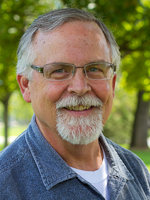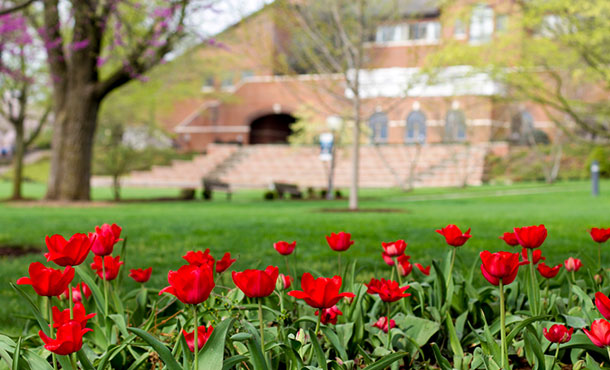A lesson on not judging someone based on outward appearances by Don Clymer, EMU professor of Spanish and humanities
“I love Americans,” Pedro announced to the small group gathered for the Wednesday evening Bible study. “I love your music, your language, your people.”

My wife, Esther, and I were leading a group of 18 EMU students and were visiting a small Mennonite congregation on the north side of sprawling Mexico City.
They were hosting us during Holy Week for a time of working, worshiping and playing together.
I was immediately put off by Pedro’s announcement. His speech was slurred, his eyes glazed over, and he wore beads around his neck and on his wrists while stuffing white ear buds in his ears. Often I had been accosted by similar statements and people in my years of learning and serving in Latin America. What was his agenda? He had to have one, I assumed, because he was too effusive, and I was pretty sure he was inebriated.
The following day the church had planned a day for the group of us to enjoy the many activities available in Chapultepec Park in central Mexico City. There were museums, a zoo, a castle, rowboats and an amusement park, to name a few. We were to divide into groups and chose our activity. At the end of the Bible study, the pastor asked for a show of hands of those who were willing and able to accompany us for the excursion. Pedro was the first one to raise his hand.

After a wonderfully harrowing ride navigating Mexico City’s public transportation system with a walk, two bus transfers and the metro, we emerged out of the bowels of the subway system into the bright, crisp air of the park. Five students along with Esther and me, chose the zoo. So did Pedro. Probably with the same misgivings about Pedro that I had, the five students hurriedly dashed off to the entrance of the zoo, disappearing among the multitudes. Esther and I were stuck with Pedro. Three hours until we were to reunite with the rest of the group for the next activity. Three hours with Pedro. I dreaded every minute.
The human tendency is to prejudge someone by their outward appearance. This is where the word “prejudice” comes from. We decide what someone is like by their race, their age, their sex or any of a number of other factors without bothering to get to know them. My prejudgment of Pedro was that he was a drunk and would be a difficult person to relate to because he “had an agenda” and probably wanted something from me. I didn’t want to be bothered by him. By prejudging him before getting to know him, I denied his God-image and likeness. By so doing, I reduced him to something less than human.
I was not the only one to prejudge Pedro. “I made a quick judgment about him as being someone I did not want to relate to, and I did not want anything to do with him,” wrote one of my students in her journal. “I was judging him for what I saw and the little I knew of him.” Because of the scene at the Bible study, I’m sure many of our students felt the same way.
God knows our tendency to judge a person by how they look on the outside, so when Samuel was looking for a king to replace Saul, God warned him: “Do not consider his appearance or his height, for I have rejected him. The LORD does not look at the things people look at. People look at the outward appearance, but the Lord looks at the heart” (1 Samuel 16:7 NIV).
Israel had already been fooled by a tall and handsome Saul, the man who had the stereotypical physique of a king but the heart of a pagan. Even in spite of this disaster, Samuel looked for these same qualities in the sons of Jesse. He had to be straightened out by God. What is in one’s heart is more important than the way one looks.
Paul, in acknowledging his own prejudices before he had an encounter with the Risen Christ, writes in 2 Corinthians 5:16-17 (CEV), “We are careful not to judge people by what they seem to be,” or, as The Message puts it, “by what they have or how they look.” I certainly judged Pedro by the way he seemed to be and the way he looked, I didn’t look at his heart.
As Esther, Pedro and I proceeded through the zoo, Pedro wanted to know the English name of every animal we came across. We became friendlier as the day wore on, enjoying his unbounded, childlike enthusiasm for all the animals and their English equivalents.
We decided to leave the zoo and have lunch together. As we ate, he told us his long, torturous story. He was studying biology at the university when he got into a bad crowd and started doing drugs. Up to that point he was doing well enough that he had several offers to continue his academic career in graduate studies or to work with some government agencies; offers that would have set him financially for life.
The deeper he got into the drug scene, however, the more distracted he became from his studies. It wasn’t long until he had to live on the streets full-time to support his habit. He dropped out of school and had never returned. What had been a promising career was left shattered on the rubbish heap beside a pile of syringes. He tried to earn a living selling candy and chewing gum from a portable stand he carried through his neighborhood.
After many failed rehabilitation programs, he wandered into an evangelical church and accepted Christ. He had been clean for over a year when we met him. “The only thing that saved me was Christ,” he testified. Because of his abuse of all sorts of drugs, his brain was fried. This explained his slurred speech and his halting behavior—making us jump to the conclusion that he was drunk.
The passage from 2 Corinthians 5 continues, “Anyone who belongs to Christ is a new person. The past is forgotten, and everything is new.” Other versions call this a “new creation.” In spite of his outward appearance, Pedro was a new creation. He had a new heart. Before I got to know his story, I could only see his outward appearance.
Pedro accompanied our entourage from EMU everywhere we went. As the week wore on, he endeared himself not only to Esther and me but to all the students. When we went to see the reenactment of Jesus’ trial and crucifixion in his gang-infested neighborhood on Good Friday, Pedro led the way. Everywhere people greeted him.
Since we were with him, in spite of sticking out like sore gringo thumbs, we felt safe and in good hands. He was the first to give out specially prepared invitations to attend his church in his neighborhood. His own transformed life was an even more powerful testimony to his old friends.
“As I started to hear his story, I started to understand him more and not have a total fear of him,” wrote the same student. “His story is a powerful [one] and shows what Jesus can do in people’s lives. I wish I hadn’t judged Pedro so quickly.” Another student gave Pedro his English-Spanish Bible. Pedro’s face radiated his gratitude. We were slowly beginning to see his heart, to see his God-image, to see his new creation.
When we left Mexico some three weeks after our time with this fascinating and hospitable Mennonite church, Pedro was among the people to show up at the airport to bid us farewell. Many of the church members brought parting gifts. Pedro brought his candy stand and passed out candies to the group with his huge, toothless smile.
Our final church service together was Easter Sunday. During that service, we circulated around all the members of the church greeting them with the phrase, “Christ is risen,” to which the other responded, “He is risen indeed.” When I came to Pedro and looked him directly in his eyes, an emotion came over me, and I said to him, “Christ is risen, and I see him in your face.” This was the same face that I had rejected just a few days earlier. Without hesitation, he replied, “Yes, I was dead and now I am alive. I have risen from the dead like Christ.” I could not hold back the tears as I hugged him. Pedro was a new creation. So was I.
Don Clymer teaches Spanish and humanities at EMU, Harrisonburg, Va., and leads cross-cultural seminars to Guatemala and Mexico. He also serves on the pastoral care team at Lindale Mennonite Church where he is a member.
This article is reprinted courtesy of The Mennonite, April issue.
